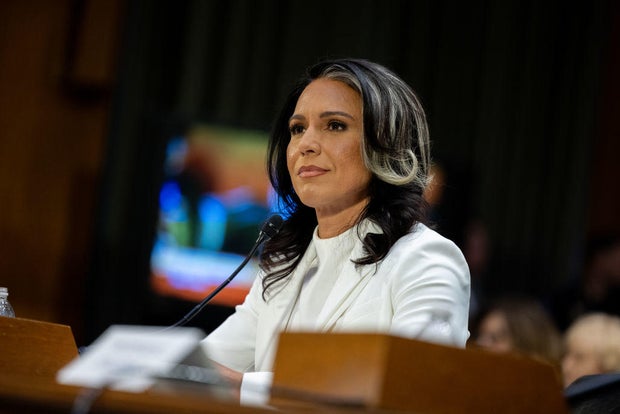Washington — Tulsi Gabbard, President Trump’s pick to be director of national intelligence, faces a crucial vote on Tuesday that could doom or propel her nomination.
The Senate Intelligence Committee will vote on her nomination in a closed session, according to a committee aide. Republicans have a one-seat majority on the panel, meaning Gabbard cannot afford to lose a single GOP vote if all members are present.
The committee could still vote to advance her nomination without a favorable recommendation if she falls short, but she also risks not having enough Republican support in a floor vote. Just four Republicans would need to oppose her to defeat her nomination if there are no Democratic defections in her favor.
Several senators have expressed concerns in the last week about her path forward.
“I’m worried by what I hear from some of my Republican colleagues,” Republican Sen. Josh Hawley of Missouri said in an interview with Fox News last Thursday. “I’m worried that her nomination may be in jeopardy.”
But she picked up support from Republican Sen. Susan Collins of Maine, a member of the committee, on Monday. Collins was seen as a potential “no” vote ahead of her announcement, but she said Gabbard addressed her concerns and shared her vision of downsizing the Office of the Director of National Intelligence.
Nathan Posner/Anadolu via Getty Images
Mr. Trump’s choice to lead the intelligence community was seen as one of the most vulnerable nominees heading into her confirmation hearing on Jan. 30, when she was grilled on a number of controversial positions she has taken over the years. She faced skepticism from senators over her decision to meet with Syrian dictator Bashar al-Assad in 2017, her past push to pardon National Security Agency whistleblower Edward Snowden, her comments about Russia’s war in Ukraine and her past opposition to renewing a key government surveillance authority, known as Section 702 of the Foreign Intelligence Surveillance Act.
The most contentious moments of the hearing came as she was repeatedly pressed by Republican and Democratic senators on whether she would characterize Snowden as a “traitor.”
Gabbard declined to directly answer the question, responding each time that “Edward Snowden broke the law.” She never said that he was a “traitor” and at one point seemed to defend his actions, telling the panel that he had exposed “egregious illegal and unconstitutional programs” that led to reforms. During the 2020 presidential campaign, Gabbard vowed to pardon Snowden, who leaked a trove of information on the U.S. government’s top-secret mass surveillance programs. Snowden fled to Hong Kong and later Russia, where he lives in exile, after the leak.
“I do not agree with or support all of the information and intelligence that he released, nor the way in which he did it,” Gabbard told senators.
Gabbard also sought to alleviate concerns about her criticisms of FISA Section 702, which allows the U.S. to collect foreign communications without a warrant. U.S. officials say it’s crucial to protecting national security because it helps disrupt terrorist attacks, cyberattacks and espionage activities. It does not allow U.S. citizens to be targeted, but their communications can be swept up when they are in contact with a targeted foreigner.
Gabbard told senators during her confirmation hearing last week it was “essential” to national security, years after she tried to repeal the controversial law.
“There are a number of areas that we would be blind from a national security perspective without this capability,” she said. “It also must exist next to having safeguards in place to ensure Americans’ civil liberties are protected.”
The former congresswoman from Hawaii has also faced criticism for her comments about the war in Ukraine and meeting with Assad, then doubting that his regime used chemical weapons against civilians.
At her hearing, Gabbard conceded that Russian President Vladimir Putin “started the war in Ukraine” and that her skepticism of the chemical weapons attack was based on “conflicting information and evidence” that she was given at the time.
#Tulsi #Gabbard #faces #crucial #Senate #committee #vote #nomination #intel #chief



